
Oswald the Lucky Rabbit is an animated cartoon character created in 1927 by Walt Disney and Ub Iwerks for Universal Pictures. He starred in several animated short films released to theaters from 1927 to 1938. Twenty-seven animated Oswald shorts were produced at the Walt Disney Studio. After Universal took control of Oswald's character in 1928, Disney created a new character similar in appearance to Oswald as a replacement: Mickey Mouse, who went on to become one of the most famous cartoon characters in the world.

The Alice Comedies are a series of live-action animated shorts created by Walt Disney in the 1920s, in which a live action little girl named Alice and an animated cat named Julius have adventures in an animated landscape. The shorts were the first work by what ultimately became The Walt Disney Company.

Plane Crazy is a 1928 American animated short film directed by Walt Disney and Ub Iwerks. The cartoon, released by the Walt Disney Studios, was the first appearance of Mickey Mouse and his girlfriend Minnie Mouse, and was originally a silent film. It was given a test screening to a theater audience on May 15, 1928, and an executive from Metro-Goldwyn-Mayer saw the film, but failed to pick up a distributor. Later that year, Disney released Mickey's first sound cartoon, Steamboat Willie, which was an enormous success; Plane Crazy was officially released as a sound cartoon on March 17, 1929. It was the fourth Mickey film to be given a wide release after Steamboat Willie, The Gallopin' Gaucho and The Barn Dance (1929).
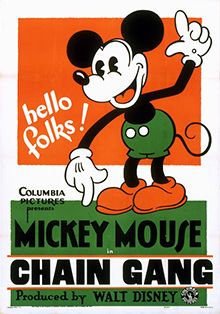
The Chain Gang is a 1930 Mickey Mouse animated film produced by Walt Disney Productions for Columbia Pictures, as part of the Mickey Mouse film series. It was the twenty-first Mickey Mouse short to be produced, the sixth of that year. It is one of a group of shorts of strikingly uneven quality produced by Disney immediately after Ub Iwerks left the studio.

The Gallopin' Gaucho is a 1928 American animated short film and the second short film featuring Mickey Mouse to be produced, following Plane Crazy and preceding Steamboat Willie. The Disney studios completed the silent version in August 1928, but did not release it in order to work on Steamboat Willie. The Gallopin' Gaucho was released, with sound, after Steamboat Willie on December 30 of the same year.
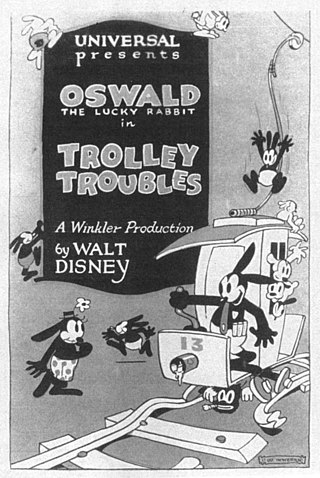
Trolley Troubles is a 1927 animated short subject film, produced by Charles Mintz and George Winkler and directed by Walt Disney. The cartoon is the first appearance of Oswald the Lucky Rabbit, a character that Disney and Ub Iwerks created for Universal Pictures and Charles B. Mintz.

Building a Building is a 1933 American animated short film produced by Walt Disney Production and released by United Artists. A remake of the 1928 Oswald the Lucky Rabbit film Sky Scrappers, the cartoon depicts Mickey Mouse working at a construction site under the supervision of Peg-Leg Pete while Minnie Mouse is selling box lunches to the workers. It was directed by David Hand, his first directorial assignment at Disney, and features the voices of Walt Disney as Mickey, Marcellite Garner as Minnie, and Pinto Colvig as Pete. It was the 51st Mickey Mouse short film, and the first of that year.

Oh Teacher is an animated cartoon directed by Walt Disney, starring Oswald the Lucky Rabbit, and distributed by Universal Pictures. The film was reissued in 1932 by Walter Lantz Productions with added music and sound effects and is the only known version to survive. The original version entered the public domain on January 1, 2023.

The Mechanical Cow is an Oswald the Lucky Rabbit cartoon from 1927. It was distributed by Universal Pictures. The cartoon was re-released by Walter Lantz Productions in 1932 with music and sound effects added.

Great Guns! is Oswald the Lucky Rabbit cartoon produced by the Walt Disney Studio and Winkler Productions. It was re-issued by Walter Lantz Productions in 1932. It was originally released on October 17, 1927. Great Guns! is a parody of war films, a popular film genre during the silent era.

Tall Timber is a 1928 silent animated short film starring Oswald the Lucky Rabbit and is the 23rd in the series. In terms of production, the film was for many years the last extant Oswald cartoon directed by Walt Disney, until late 2015, when Sleigh Bells, the Oswald cartoon made after Tall Timber, was rediscovered.

Bright Lights is a 1928 silent cartoon short by the Walt Disney Studio and Winkler Productions featuring Oswald the Lucky Rabbit. It is among the few short films of the series Walt Disney himself worked on before leaving that same year.

Hungry Hoboes is a silent Oswald the Lucky Rabbit cartoon released by Universal Studios on May 14, 1928. It had been lost since before World War II and was rediscovered in 2011.
Kounty Fair is a 1930 animated cartoon released by Universal Pictures starring Oswald the Lucky Rabbit.
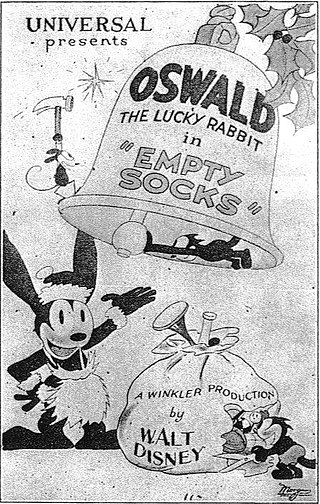
Empty Socks is a 1927 short animated film made by Walt Disney and Ub Iwerks that was considered a lost film until its rediscovery in Norway in 2014. The film stars Oswald the Lucky Rabbit.

Sleigh Bells is an American animated short film featuring Oswald the Lucky Rabbit. It was directed by Walt Disney and Ub Iwerks and released in 1928 by Universal Pictures. The film was thought to be lost until a print was discovered in the BFI National Archives in 2015.
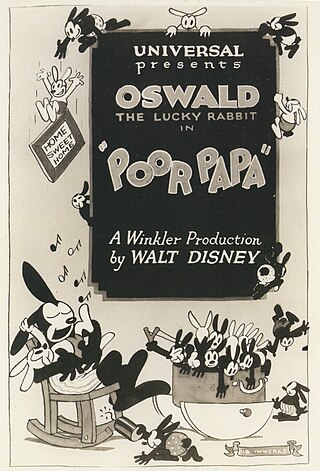
Poor Papa is a 1927 animated short subject film, produced and directed by Walt Disney that was released in 1928. The cartoon is the first produced Oswald cartoon, featuring Oswald the Lucky Rabbit, a character that Disney and Ub Iwerks created for Universal Pictures and Charles B. Mintz. Oswald would later serve as the basis for the Mickey Mouse film series. This was the first Oswald short made but the twenty-first Oswald short to be released.

The Cactus Kid is a Mickey Mouse short animated film first released on May 10, 1930, as part of the Mickey Mouse film series. It was the eighteenth Mickey Mouse short to be produced, the third of that year.
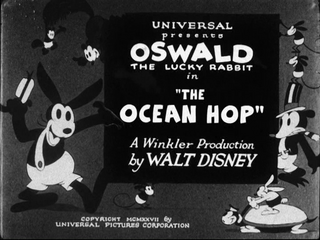
The Ocean Hop is a 1927 animated short subject film, produced by Charles Mintz and George Winkler and directed by Walt Disney. The film was reissued in 1932 by Walter Lantz Productions with added music and sound effects and is the only known surviving version. The short entered the public domain on January 1, 2023.

All Wet is a 1927 animated short subject film, produced by Charles Mintz and George Winkler and directed by Walt Disney. The film was reissued in 1932 by Walter Lantz Productions with added music and sound effects and is the only known version to survive. The short entered the public domain on January 1, 2023.



















